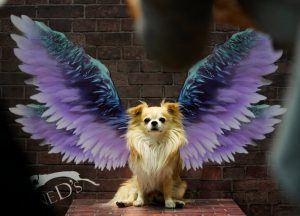
Can you guess this dog’s breed for the good of science? Hint: The wings are a red herring. Credit Shizuo Kambayashi/Associated Press
Today, Sunday May 6, is May Day For Mutts Day. We thought this article from the New York Times was interesting. By the way, several years ago The Puppy Up Foundation helped fund two studies by The Broad Institute. (See below, after the article.)
From The New York Times
By JAMES GORMAN
One of the favorite pastimes of dog people is guessing a mutt’s ancestry.
Is that scruffy little guy in the dog park a mix of Afghan hound and Catahoula leopard dog? Is the beast that bit someone really a pit bull, or a cocker spaniel-beagle potpourri? And how about your aunt’s yippy pillow on paws — Maltese/poodle/peke?
If you’re wondering about your own dog you can, of course, get a DNA test. But there’s a lot of open territory for that familiar figure in the canine world, the dog guesser. You know who I mean, they’re like dog whisperers, but louder.
Now all self-proclaimed experts have a chance to prove their mettle or meet their comeuppance. The MuttMix survey debuted on Monday. It is citizen science for people who are willing to be proven terribly wrong, a dog quiz that tests how good you are at figuring out what a mutt is made of.
The survey is being run by the Darwin’s Dogs program at the Broad Institute in Cambridge, Mass., a center for genome studies, and the International Association of Animal Behavior Consultants. Fellow dog guessers (yes, I confess) proceed at the risk of your exceedingly high self-regard.
Here’s how it works: Anyone who signs up can guess, using a list of breeds, the top three purebred strains in each of 31 mutts. Each dog is represented by two photos, a quick video clip and sometimes a bit of additional information, like “hair, not fur” or “webbed feet.” These are clues to people who actually know something about dogs.
I took the survey, and I can say already that it is humbling. When I get the results, which will come only after the survey is concluded in two months (the organizers don’t want the answers to leak out) I expect I will find it humiliating.
Clearly Sandy is an American Doghair.
My qualification for dog guessing is that I spent my childhood studying the American Kennel Club breed book the way other kids studied baseball cards and automobile grills. It has stood me in good stead. My proudest moment in dog identification came when I correctly asked, about a small dog scurrying around a plant nursery in the Adirondacks, “Is that a Schipperke?”
Yes! It was.
I have also correctly identified Brussels Griffons on the leash in Manhattan.
But, faced with photographs of mixed breeds and having to pick more than one ancestral strain, I realized that I don’t really know anything about what happens when dogs interbreed. I am now a firm believer in getting mutts as pets, but I tend to think of all mutts as Labrador retrievers mixed with something, if they are big, or poodle mixes if they are small, with a few chihuahuas thrown in.
I’m not alone, apparently. Elinor Karlsson, a genetic researcher at the Broad Institute, who runs Darwin’s Dogs among other projects, said, “People look at dogs as a something and a something. Turns out that it’s way more complicated than that.”
The Darwin’s Dogs program — an attempt to draw on dog owners to build a database of purebred and mixed breed dogs — has been collecting DNA by asking dog owners to take a saliva sample and send it in, along with photos and answers to a very detailed questionnaire about the dog’s appearance and behavior. So far, it has 17,400 dogs signed up, and 400 dogs with their DNA sequenced. The program does not charge, so far, for the genetic sequencing, and does not promise an immediate result.
But from its own data and other canine genetic research, it has the answers on what breeds went into the making of each dog in the survey.
If you want quick results for your own dog, there are other ventures. Embark, a company founded by Adam Boyko, a dog geneticist at Cornell University, says it has the most accurate DNA test among commercial services.
For $199, an owner can send in a dog’s DNA, as you would if you were getting human DNA tested. His company tests 200,000 so-called genetic markers, or sites in the DNA, similar to the number tested at the Broad Institute. It then provides a complete report to the pet owners on the dog’s breed, or breeds and genetic health factors.
The goal of the MuttMix survey, for Dr. Karlsson, is to learn how good people are at identifying dog breeds.
Studies The Puppy Up Foundation helped fund with The Broad Institute:
Title of Study: Osteosarcoma
Grant Awarded: $20,000
Principal Investigator: Kerstin Lindblad-Toh
Scientific Director of Vertebrate Genome Biology at the Broad Institute
Broad Institute of MIT and Harvard
Title of Study: Mast Cell Tumors
Grant Awarded: $20,000
Principal Investigator: Kerstin Lindblad-Toh
Scientific Director of Vertebrate Genome Biology at the Broad Institute
Broad Institute of MIT and Harvard








